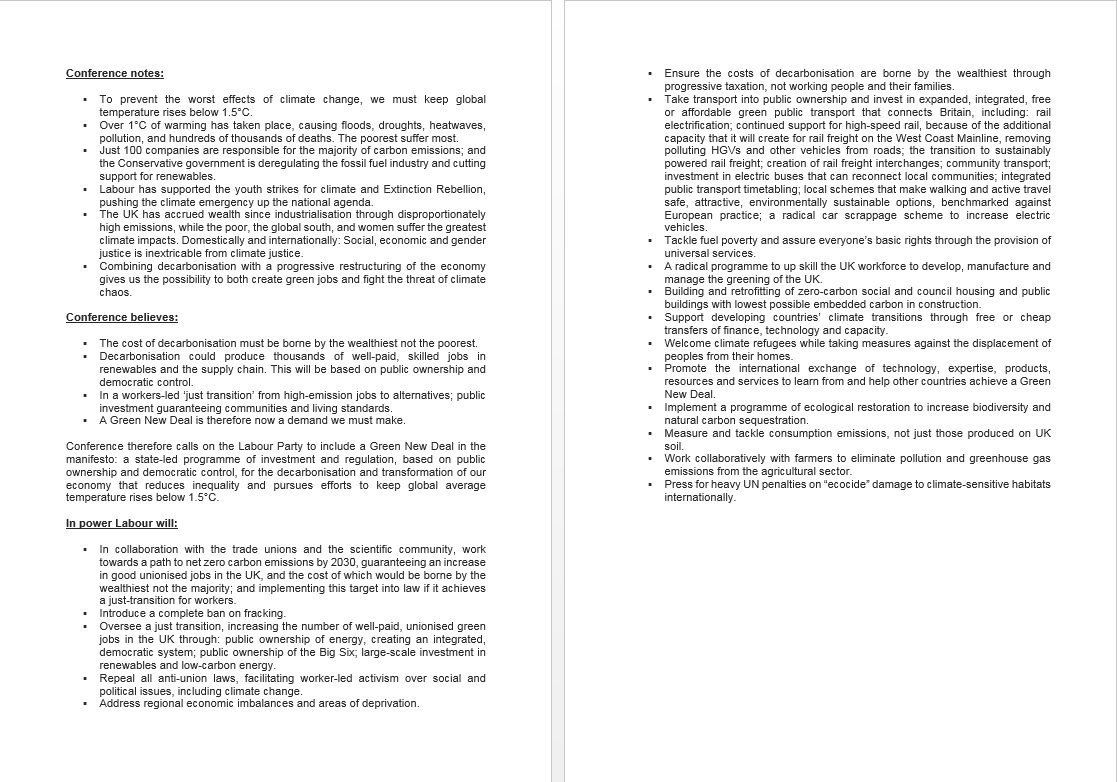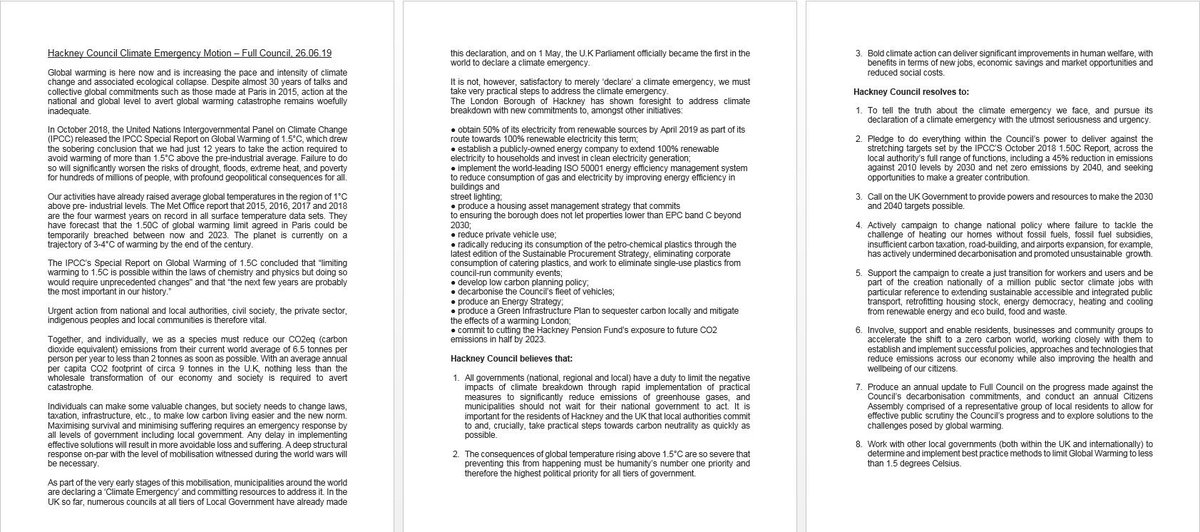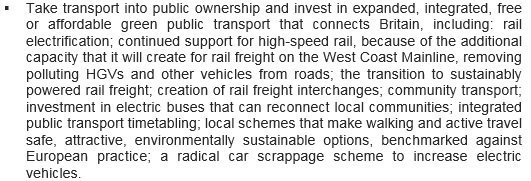1/ So, here& #39;s the #GreenNewDeal motion passed at Labour Party Conference 2019. These commitments will form the foundation of our environmental offer at the next General Election. For comparison, I& #39;ve also included @HackneyLabour& #39;s June 2019 Climate Emergency motion.
2/ As people will be aware, I& #39;ve expressed grave concerns about the growth-based nature of the #GreenNewDeal in its U.S incarnation. I have to say, our own commitments are even less impressive, which was no doubt the product of the comprom...sorry...compositing process.
3/ But first, let& #39;s get the positive elements of Labour& #39;s #GreenNewDeal commitment - and there are some very positive elements - out of the way. Firstly, this is progress. Despite our - in some cases cynical and careerist - rhetoric on & #39;addressing the climate emergency& #39;...
4/ ..., the labour movement is still full of people who are in denial about the scale of the crisis we face and the actions required to address it. How else could our largest affiliated industrial union and at least 119 Labour MPs continue to support a Heathrow third runway?
5/ So, to get us even to this stage is a major achievement by those who delivered Labour& #39;s #GreenNewDeal motion... https://abs.twimg.com/emoji/v2/... draggable="false" alt="👏" title="Clapping hands sign" aria-label="Emoji: Clapping hands sign">
https://abs.twimg.com/emoji/v2/... draggable="false" alt="👏" title="Clapping hands sign" aria-label="Emoji: Clapping hands sign"> https://abs.twimg.com/emoji/v2/... draggable="false" alt="👏" title="Clapping hands sign" aria-label="Emoji: Clapping hands sign">
https://abs.twimg.com/emoji/v2/... draggable="false" alt="👏" title="Clapping hands sign" aria-label="Emoji: Clapping hands sign"> https://abs.twimg.com/emoji/v2/... draggable="false" alt="👏" title="Clapping hands sign" aria-label="Emoji: Clapping hands sign">
https://abs.twimg.com/emoji/v2/... draggable="false" alt="👏" title="Clapping hands sign" aria-label="Emoji: Clapping hands sign">
6/ The good stuff. Firstly, the recognition that the transformation of the energy system and broader decarbonisation presents an almost unique opportunity to address the structural flaws in our economic infrastructure and reverse the trend towards uneven economic geography.
7/ The acceptance that there are some carbon-intensive jobs that have no future in a net zero world, and the explicit commitment to a series of sunset, & #39;just transition& #39; policies that address the fallout from this process is, of course, also welcome.
8/ The outright commitment to "a complete ban on fracking" is hugely heartening, and not before time. Did the GMB support the #GreenNewDeal motion? If they did, this marks a radical depature from their longstanding position on fracked gas, which would be a big step forward.
9/ The Transport section is both highly-detailed and full of good ideas - this must have been the result of work from @ASLEFunion and @TSSAunion - but is most notable for its electric car delusion and criminal omission of aviation emissions. But, more on that later.
10/ I& #39;m delighted at the commitment to Universal Basic Services, which form the foundation of low-carbon prosperity through creation of non-rivalrous, non-exclusionary public goods; will place human labour and community at the centre of our emergency response to global warming.
11/ The support for not merely reversing the Government& #39;s attacks on energy efficiency - to benefit private house builders - but to treat zero carbon homes as a national infrastructure priority, as per @theCCCuk& #39;s recommendation, is quietly revolutionary... https://www.vice.com/en_uk/article/xwpvva/developers-who-got-rich-off-tory-housing-policy-are-sponsoring-conference">https://www.vice.com/en_uk/art...
12/ The motion& #39;s internationalist credentials of assisting decarbonisation in the economies with the most rapidly-growing emissions and promotion of knowledge and expertise exchange represent a tantalising vision of how the U.K can help transform our international institutions...
13/ The commitment to nature-based solutions to the climate emergency, while clearly requiring a great deal more work, is both welcome in terms of its scale and in terms of it focus on collaboration with small agriculture...
14/ Finally, the first steps towards an acknowledgement that resource depletion, and not merely greenhouse gas emissions, are playing a huge role in the climate emergency, and that demand-side policies are required to address this, was as surprising as it is welcome...
15/ Now, for the bad news...
16/ Firstly, there& #39;s the arbitrary 2030 net-zero target. It& #39;s ambitious, but where does it come from? Hackney& #39;s targets are rooted in the higher confidence thresholds of IPCC 1.5C. The national Party& #39;s target feels like it has been plucked from thin air and not thought through.
17/ Why does this matter? While there are a wide variety of #climateemergency decarbonisation targets floating about, they& #39;re almost universally ambitious. If administrations deliver against them, it will involve making unpopular decisions, like actively reducing car ownership.
18/ When those unpopular decisions are put before the public, local authorities and gov& #39;ts will need to be explain why they are being made. Hackney& #39;s targets are backed by the most contemporary science, which gives them legitimacy. Others won& #39;t have that argument to fall back on.
19/ ...which raises questions about whether those committing to net zero by 2030, and in some cases (despite no policy support) 2025, fully understand what this involves, and there& #39;s good reason on reading the #GND motion passed at #Lab19 to support that view. Here& #39;s why...
20/ For a start, it contains specious statements like "just 100 companies are responsible for the majority of carbon emissions". While this is superficially true, this is merely a function of the tendency towards monopoly in capitalism.
21/ The idea that these emissions wouldn& #39;t exist if we clicked our fingers and made these companies disappear is not credible. These companies are producing some of the widely consumed commodities on Earth. If they didn& #39;t exist, other companies would exist to do the same...
22/ ...so, on the whole, emissions are a product of demand, not supply-side, conditions. Companies exist to service our demand for what they supply, so the largest potential for decarbonisation lies in reducing demand, a massively taboo subject for the Labour Party. Why?
23/ It& #39;s easy to forget, given the welcome zeal with which the post-2015 leadership has adopted relatively radical environmental positions, that Labour& #39;s political economy of & #39;more stuff for the workers& #39; is fundamentally growth focused in it complexion.
24/ There is obviously a natural tension between this growth-based world view and the necessity of securing a sustainable environmental settlement, and this tension abundantly clear in national Labour& #39;s Green New Deal motion, not by what it includes, but by what it omits.
25/ First and foremost, the motion does not deal in any way with the problem of *too much stuff*. What do I mean by too much stuff? #EarthOvershootDay - the day on which humanity exhausts the biological resources the planet can renew in a year - now takes place on 29 July...
26/ ...and, despite this worrying fact, reliable sources such as @OECD and @icao estimate a doubling of resource and meat consumption, and an increase in flights of 300-700% by 2050. Yet, our national Green New Deal motion barely alludes to the issue of consumption...
27/ ...and, where it does, you will note that the reference is to "consumption emissions", rather than the consumption itself, as if manufacturing tropical hardwood garden furniture on a clean electricity grid is *the* solution... https://twitter.com/jonburkeUK/status/1177202029703376902">https://twitter.com/jonburkeU...
28/ There are a lot more issues to unpack, which I intend to do over the next couple of days, so please bear with me. Also, this comes from a good place - the Labour leadership is light years ahead of where it was, but still a long way from where it needs to be on these issues.

 Read on Twitter
Read on Twitter








